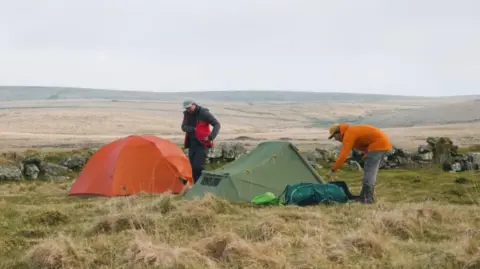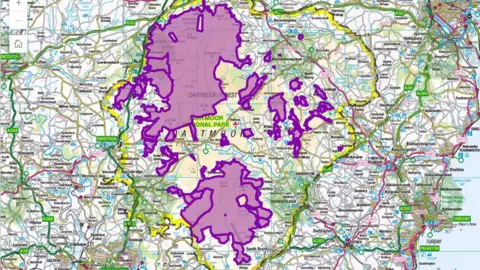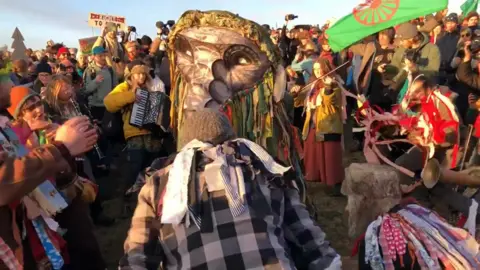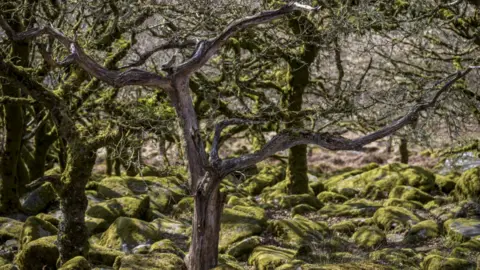How did we get to Dartmoor wild camping ruling?
 John Harding
John HardingThe Supreme Court has ruled people have the legal right to wild camp on Dartmoor.
The ruling, which is likely to reignite debate over public access to land in England, means Dartmoor National Park in Devon remains a place where hikers can pitch a tent under the stars without needing permission from landowners.
Wild camping has long been legal in Scotland under the Land Reform (Scotland) Act 2003, but in England there is no general right to wild camp on most private land, with Dartmoor being an exception.
What sparked the Dartmoor wild camping debate?
The Dartmoor wild camping tradition was thrown into question in January 2023, when landowners Alexander and Diana Darwall won a High Court ruling that gave them the right to remove campers from their 4,000-acre estate on Stall Moor near Cornwood on the southern flanks of the moor.
The Darwalls, who keep cattle on the land, argued that wild camping posed risks to livestock and the environment.
Their legal team claimed that the 1985 Dartmoor Commons Act, which allows access for "open-air recreation", did not explicitly include overnight camping.
But the Dartmoor National Park Authority (DNPA), backed by a coalition of campaigners and conservationists, contended that wild camping was a long-standing and integral part of Dartmoor's recreational heritage.
The legal battle has drawn national attention not only because of its implications for public access, but also because of Dartmoor's cultural and ecological significance as it is home to pockets of temperate rainforest.
 Dartmoor National Park Authority
Dartmoor National Park AuthorityWhile the court ruling has clarified the right to wild camp, it doesn't automatically grant permission on all private land.
In some areas wild camping is only allowed with the explicit permission of the landowner.
What are campers allowed to do?
- People are legally allowed to camp in set areas of Dartmoor commons provided they follow a code of conduct
- Tents and camping equipment must fit in a carriable backpack
- No more than six people are allowed to camp together
- Campers must blend into the landscape, out of sight from roads and buildings
- Maximum camping length is two nights
- No overnight stays in vehicles, campervans or motorhomes
- Leave no trace - do not light fires and take all rubbish away
What do campers say?
When filmmaker and wild camper John Harding recorded a three-day trek across Dartmoor in April 2024 he said "the motivation was that the right to wild camp was under threat".
"I was pretty incredulous, I didn't even imagine this would ever be something we'd have to debate," he said.
For Harding, Dartmoor was a place of connection and transformation.
"I'd been camping on Dartmoor for about five years with friends and family," he said.
"Myself and my father became much closer because of it. We had some amazing experiences trekking across the moor."

The 2024 trek was "hard going at times, particularly carrying filming equipment, tents, sleeping bags, sometimes 13 to 15 kilograms on your back," he said.
"But that's part of the appeal. You're not just looking at nature from the outside. You're challenging yourself to survive across it."
The legality of wild camping, he believes, is crucial, not just for seasoned campers, but for those just starting out.
"You get a much, much deeper connection to the land when you spend a night on it," he said.
"The first time we tried to cross the whole moor, me and four friends, we camped on the south side, laid out on the grass, and just watched shooting stars go by.
"It was magical. That couldn't have happened if we couldn't wild camp."
 Duchy of Cornwall/Charles Sainsbury-Plaice
Duchy of Cornwall/Charles Sainsbury-PlaiceWhat does it mean for the right to roam?
Campaigners like The Stars are for Everyone said the case sparked a renewed interest in access to land and they are calling for broader legislative change.
"We now want the government to step up and pass a right to roam act, to protect and extend public rights of access to nature across England," said spokesperson Lewis Winks.
The case has "really illustrated the problem at the heart of our access system", he said.
"At a time when we are so disconnected from the natural world, when we desperately need these opportunities for our mental health, our well-being, and our physical health, people should be able to do things like wild camp and learn to do it responsibly.
"It's wild camping on Dartmoor that offers that opportunity so brilliantly."
The granite that forms Dartmoor goes back 300 million years and humankind has shaped it over the last 10,000 years.
The moors are dotted with ancient cairns, stone circles and about 37% of the park is classified as common land, though it remains privately owned, according to the DNPA.
The Darwalls' land was at the centre of their challenge to the right to wild camp in 2022.
In response to their legal challenge, in January 2023, more than 3,000 people marched across the Darwalls' estate, carrying placards and a large puppet of Old Crockern, a mythical guardian of the moor.
The Court of Appeal overturned the High Court ruling in July 2023, restoring the right to wild camp.
The Darwalls were granted permission to appeal to the Supreme Court, where the final decision was made earlier.
'Disappointed'
Alexander and Diana Darwall said in a statement that they were "disappointed" by the Supreme Court's judgment.
"Our aim from the outset was to protect and preserve Dartmoor, its flora and fauna," they said.
"Landowners and farmers have always played a vital part in the conservation of Dartmoor.
"Hollowing out the role of landowners and farmers will not improve the vitality of the Dartmoor Commons."
Follow BBC Devon on X, Facebook and Instagram. Send your story ideas to [email protected].
